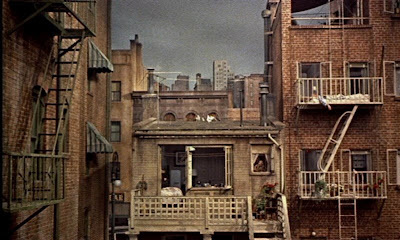As I am now finishing off the assignment part of the blog, I have decided to discuss what makes a film great. Perhaps, there is no better director than Alfred Hitchcock to learn an answer to this question, and as we have just watched a selection of his more famous films, I decided to look up what makes Hitchcock films great. I came upon this interesting website
Techniques
that discusses some of Hitchcocks in making a great film. I do recommend going to this website to check it out, but I will discuss some of techniques listed as well. I have also decided that I will use Rear Window as the basis of my discussion (only one exception), because as of now it is my favorite Hitchcock film (this is very subject to change, as my favorite Beatles song does from time to time)
Frame for Emotion- This is in my opinion one of things Ive noticed this term that Hitchcock did better than the rest. What make us connect to the film, is so much how we connect on an emotional level to the characters.

Its almost like shes kissing me!
Camera is not a camera- The genius behind Rear Window is that we too are trapped in the wheelchair, we are bounded to the room, and see what Jimmy Stewart sees. It has a certain feel to it, as we see evrything through his eyes.

It feels like were looking through our window
Dialouge Means Nothing & Point of View Editing- Throughout Rear Window, the most important things being said, are said through watching Stewart’s eyes, his reaction to his surroundings made the film much more tense.
Montage- (Here I will discuss Psycho because I think its the law that when discussing a Hitchcock montage you must discuss “The Shower Scene”)
One if the great things about this scene is the fact that we never see the knife hit her, however, beacuse of the quickc uts and pacing of the scene, an even higher sense of violence is felt. I like the quote this page attributes to Hitchcock, that this montage effect is “transferring the menace from the screen into the mind of the audience.”
Suspense is Information-
In Rear Window we are not certain if the neighbor actually murdered his wife until the very end. The film keeps jerking us into defferent directions, as to whether there has been a murder, or that Stewart is being paranoid. We are definately guided into thinking a murder has taken place, but the authorites do not know this. It adds so much to the film, that we have certain unconfirmed beliefs that are not confirmed until the end of the film.

Murderer or Innocent Neighobor? wait till end of film to confirm your suspisions
Suprise and Twist-
We all love the suprise/twist ending and with the nighbor coming over to try to silence Stewart and ironically breaking both of his legs, we were given one. The suprise ending is improtant in films as since we tend to have short memories, the ending of the film is what gives us the lasting appeal ( I think M Night Shymelan only like this technique).
As were are all now amatueur filmmakers, we can learn from the genius of Hitchcock to make our films great.


